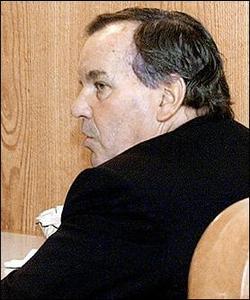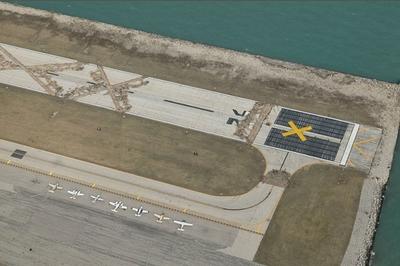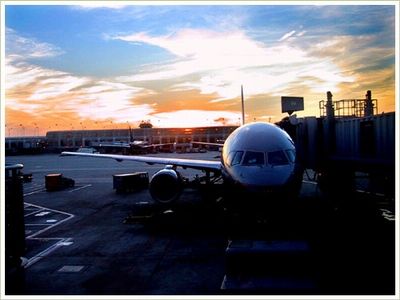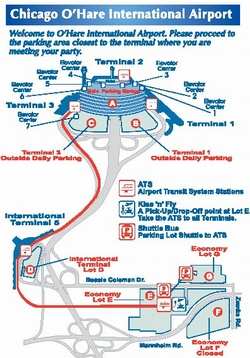Daley Speaks Out
 It's not a good thing to destroy an airport when
you need more runway capacity. That's the word from a consultant to
Chicago Mayor Richard Daley, after telling Hizzoner, even with an
expanded O'Hare International, Chicago simply needs more runways
and gate space.
It's not a good thing to destroy an airport when
you need more runway capacity. That's the word from a consultant to
Chicago Mayor Richard Daley, after telling Hizzoner, even with an
expanded O'Hare International, Chicago simply needs more runways
and gate space.
It began last week with a late Sunday night raid ordered by
Mayor Richard Daley on Meigs Field, the city's lakefront general
aviation airport.
Then, a consultant's report said the proposed expansion of
O'Hare would not be enough to solve the problem of overcapacity and
delays. Also, Sen. Peter Fitzgerald (R-IL), once opposed to giving
Chicago a say in a proposed third airport suggested the city
instead should run it; and Daley announced that he had not been
elected to be a lover boy.
Arrogance? Not Daley..."They didn't elect me to be a lover
boy"
Daley, bristling at suggestions that bulldozing the runway at
Meigs without warning showed arrogance, explained Thursday why
nearly 80 percent of voters picked him in the latest mayoral
election.
"Sometimes you have to make decisions. You make decisions,
decisions being made. People want you to make decisions. They
didn't elect me to be a lover boy," said the mayor.
Explaining why he forced Meigs Field to be closed, Daley blamed
the threat of terrorist attack by a small plane. But he has said
previously he wanted to turn the space into a park.

This Guy Might Run Peotone?
Daley also offered a geography lesson in response to
Fitzgerald's suggestion that Chicago could control the proposed
Peotone airport, which would be built nearly 40 miles south of
Chicago.
"First of all, I don't want any ownership of Peotone. I hope
that Sen. Fitzgerald understands, and those who are supporting
Peotone, that that resides in Will County," Daley explained. "It's
a county just south of Chicago and south of Cook County."
Fitzgerald said he thought the idea made sense, despite the
geography. "I think that there's some internal logic in having the
city's three airports operated by the same operator because you
could manage them in a way that they don't undercut each other," he
said.
The dispute over Peotone and O'Hare expansion has simmered for
years, and created unlikely political alliances as Democrats lined
up with Republicans on both sides of the plan. Aaron Gellman, a
professor at Northwestern University's Transportation Center in the
Kellogg Graduate School of Management, said Fitzgerald's offer to
Daley indicates how big a role politics plays in the process.
"Peotone should not be the fiefdom of the mayor," he said.

Make 'Em National Airports
"The 40 or 50 largest airports should be declared the collective
assets of the nation and taken out of the control of local
officials," Gellman said. But that seems unlikely, and because
O'Hare is a key part of the major airlines' hub-and-spoke system,
when air traffic is delayed in Chicago it ripples throughout the
country. Studies project the problem only getting worse.
Under a deal worked out between Daley and former Gov. George
Ryan in December 2001, a $6 billion expansion of O'Hare was tied to
the construction of a more modest airport near Peotone, as well as
to an agreement to keep Meigs Field open for up to 25 years.
But Fitzgerald's opposition kept O'Hare expansion from making it
into federal law. Then Ryan left office and Daley tore up Meigs
Field's runway, prompting an after-the-fact lawsuit Friday by the
Friends of Meigs Field, a group which wants to see the airport
reopened.
Expanding O'Hare: Not Enough
 Meanwhile, a consultant paid by Chicago to study
the O'Hare plan, Ricondo & Associates, reported that O'Hare
expansion would not be enough to keep pace with the projected
growth in traffic at there.
Meanwhile, a consultant paid by Chicago to study
the O'Hare plan, Ricondo & Associates, reported that O'Hare
expansion would not be enough to keep pace with the projected
growth in traffic at there.
And the crunch may get even worse in the near future.
The FAA issued new rules last week that preclude 41 airlines
from participating in a complicated runway procedure designed to
allow more flights at O'Hare. During busy periods, hourly capacity
could be reduced by up to 30 planes.
O'Hare handles about 920,000 flights a year. Daley said in 2001
that his plan would enable the airport to handle 1.6 million
flights and would cut delays by 95 percent in bad weather and 79
percent overall. But a simulation by the consultant found that
delays at O'Hare would increase even at 1.3 million flights a
year.
"I don't think the study was as negative toward O'Hare as has
been suggested," said Joseph Schwieterman, an economics professor
at DePaul University who follows the airline industry. "I think the
study shows there's room for both the O'Hare and Peotone projects,"
he said.
While Gov. Rod Blagojevich urged that O'Hare be a priority, he
shared that view: "I do see that both O'Hare expansion and Peotone
can co-exist." Many aviation experts see the need for both.
"Looking out 25 years, the need for new runway space is
staggering," Schwieterman said.
 ANN's Daily Aero-Linx (06.29.25)
ANN's Daily Aero-Linx (06.29.25) ANN's Daily Aero-Term (06.29.25): Gross Navigation Error (GNE)
ANN's Daily Aero-Term (06.29.25): Gross Navigation Error (GNE) Classic Aero-TV: Anticipating Futurespace - Blue Origin Visits Airventure 2017
Classic Aero-TV: Anticipating Futurespace - Blue Origin Visits Airventure 2017 NTSB Final Report: Cirrus SR22
NTSB Final Report: Cirrus SR22 Airborne Affordable Flyers 06.26.25: PA18 Upgrades, Delta Force, Rhinebeck
Airborne Affordable Flyers 06.26.25: PA18 Upgrades, Delta Force, Rhinebeck






